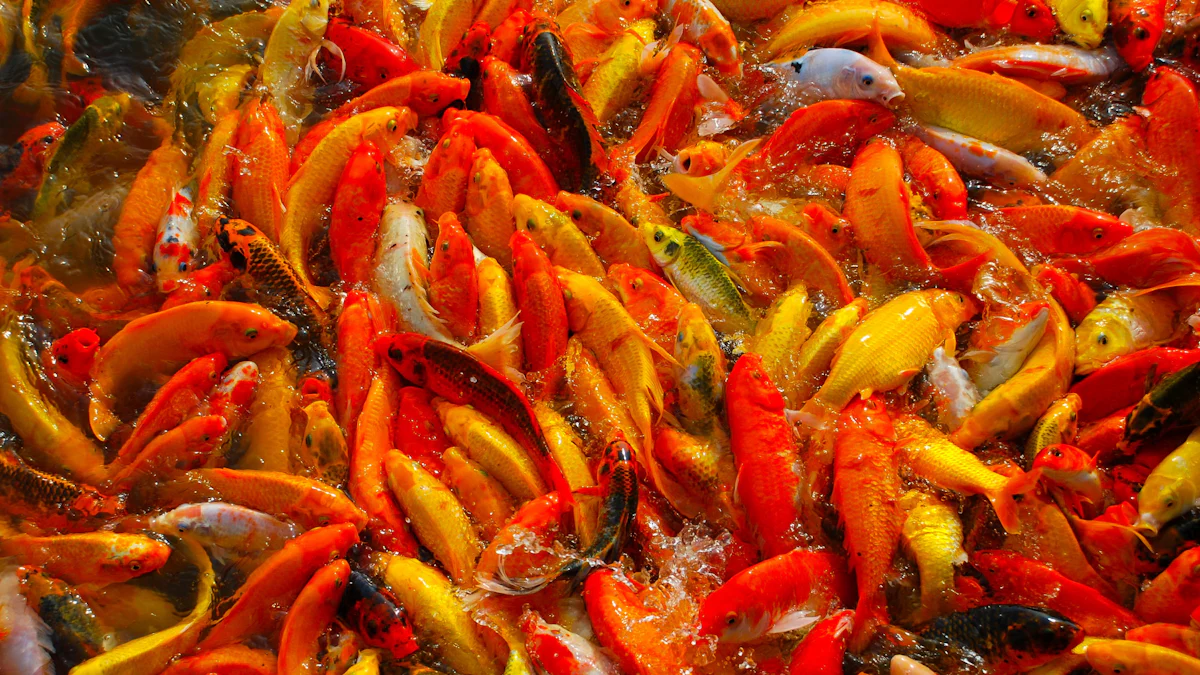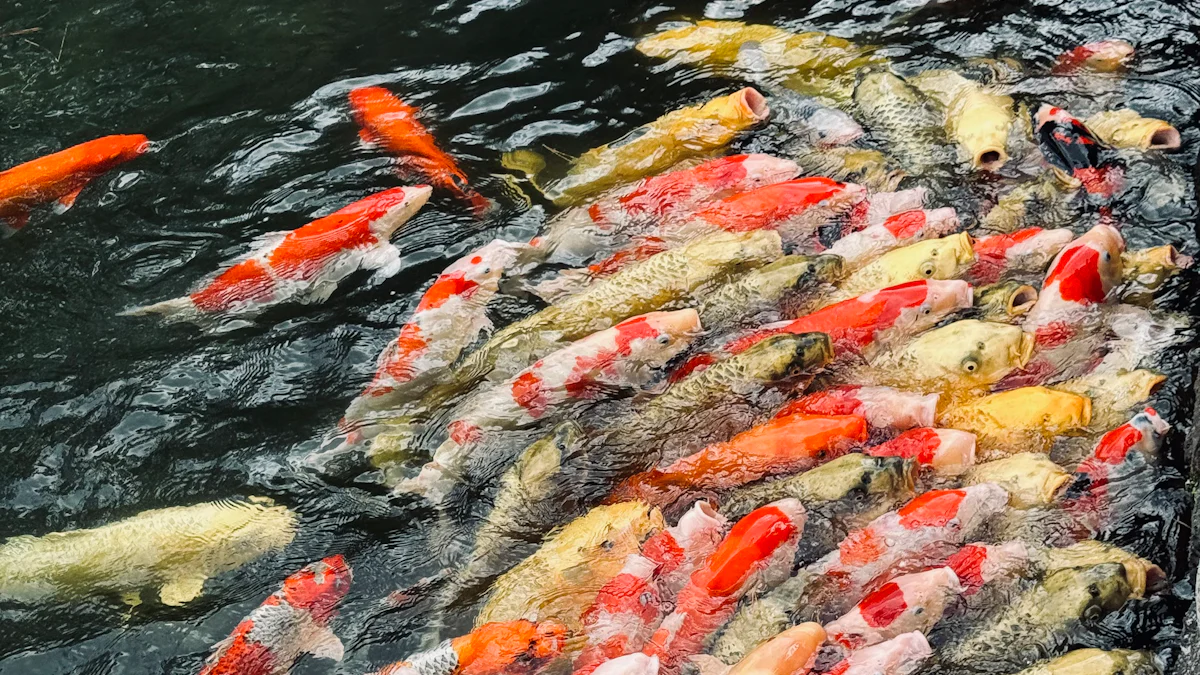
Yes, pond fish can eat dried mealworms, and they absolutely love them! I’ve found that these little treats, specifically pond fish mealworms, are packed with protein—about 50-60%—which helps fish grow strong and repair their tissues. They’re also loaded with energy-rich lipids and essential vitamins like B12 and D. That’s why I always recommend adding pond fish mealworms to your fish’s diet, but in moderation. Mealworms shouldn’t replace other foods like pellets or veggies. Instead, they’re a great supplement to keep your fish happy and healthy. Plus, sourcing dried mealworms is eco-friendly, so it’s a win-win for your pond and the planet!
We offer high-quality dried mealworms that meet FDA standards and come with a Veterinary Health Certificate. You can shop confidently knowing you’re getting the best for your pond fish. With a variety of package sizes and affordable prices, we’ve got you covered. If you have any questions, feel free to reach out—I’m here to help!
Key Takeaways
- Pond fish enjoy dried mealworms. They are high in protein (50-60%) and important nutrients. These help fish grow and heal.
- Give dried mealworms in small amounts. Mix them with pellets and veggies for a healthy diet.
- Soak mealworms before feeding. This helps smaller fish digest them and avoids choking.
- Watch how much you feed. Too much food can hurt fish and dirty the water.
- Dried mealworms are healthy and safe. They meet FDA rules and are a great snack for many pond fish.
Nutritional Benefits of Pond Fish Mealworms
High Protein Content
When it comes to protein, dried mealworms are a powerhouse. They contain about 50-60% protein, which is higher than many other fish foods. This makes them an excellent choice for pond fish. Protein is essential for tissue repair and muscle growth, especially during active seasons like spring and summer. I’ve noticed that my fish seem more vibrant and energetic when I include pond fish mealworms in their diet.
Here’s a quick comparison of protein content in dried mealworms versus other common fish foods:
| Source | Protein Content (Dry Weight) |
|---|---|
| Mealworm Larvae | 36.3% – 74.1% |
| Commercial Oat Feed | 63.3% – 68.9% |
Dried mealworms also mimic the nutritional profile of natural prey, which helps fish feel like they’re eating in the wild. That’s a win for their health and happiness!
Essential Nutrients for Growth
Pond fish mealworms aren’t just about protein. They’re packed with other nutrients that support growth and overall health. For example, they contain essential fatty acids that help maintain healthy skin and scales. This is especially important during colder months when fish might be more vulnerable to illnesses.
I’ve read that dried mealworms are widely accepted in the aquarist community because they resemble the natural diet of many fish species. This means they’re not only nutritious but also instinctively appealing to your fish. Including them in your fish’s diet can make a noticeable difference in their growth and vitality.
Energy Boost for Active Fish
If your fish are active swimmers, they’ll love the energy boost from dried mealworms. These little treats have a lipid content of 28% and an energy density of 21,309 J/gram. That’s a lot of energy packed into a small snack! I’ve found that my fish stay more active and playful after enjoying mealworms, especially during colder seasons when natural food sources are scarce.
The combination of high protein and fat content makes pond fish mealworms a perfect energy source. They’re particularly beneficial for koi and goldfish, which are known for their lively behavior. Plus, feeding them mealworms helps maintain their natural feeding instincts, keeping them happy and healthy.
We aim to supply better quality mealworms for your pets. Let your pets get high nutrition to be stronger and healthier. All of our mealworms meet FDA standards and come with a Veterinary Health Certificate. You can buy them without any worry. We offer high-quality dried mealworms at affordable prices in a range of package sizes to fit your needs. I hope you enjoy the online shopping experience we’ve established! Feel free to contact us if you have any questions or advice.
How to Feed Pond Fish Mealworms
Appropriate Portion Sizes
When feeding pond fish mealworms, I always start with small portions. Fish should be able to eat everything within a few minutes. This prevents leftovers from sinking to the bottom and polluting the water. I’ve noticed that observing my fish during feeding helps me figure out the right amount. If they finish quickly and seem eager for more, I’ll add a little extra next time. For smaller fish, I break the mealworms into smaller pieces to make them easier to eat.
Here’s a tip: It’s better to underfeed than overfeed. Overfeeding can lead to water quality issues and even harm your fish’s health. So, keep an eye on how much they’re eating and adjust as needed.
Frequency of Feeding
I’ve found that feeding dried mealworms once or twice a week works best. This keeps my fish happy without overloading their diet. Mealworms are a treat, not a staple food, so I mix them with other foods like pellets or vegetables. Offering small portions during these weekly feedings also helps prevent overfeeding and keeps the water clean.
If you’re new to feeding mealworms, start slow. Watch how your fish react and adjust the frequency if needed. Remember, variety is key to a balanced diet.
Should You Soak Mealworms Before Feeding?
Soaking dried mealworms before feeding can make a big difference, especially for smaller fish. I usually soak them in water for a few minutes to soften their tough exoskeletons. This makes them easier to chew and digest. It also reduces the risk of choking, which is especially important for younger or smaller fish.
If you’re feeding larger fish like koi, soaking isn’t always necessary. However, I still recommend it during colder months when fish digestion slows down. It’s a simple step that ensures your fish can enjoy their meal without any issues.
We aim to supply better quality mealworms for your pets. Let your pets get high nutrition to be stronger and healthier. All of our mealworms meet FDA standards and come with a Veterinary Health Certificate. You can buy them without any worry. We offer high-quality dried mealworms at affordable prices in a range of package sizes to fit your needs. I hope you enjoy the online shopping experience we’ve established! Feel free to contact us if you have any questions or advice.
Potential Risks of Feeding Pond Fish Mealworms
Risk of Overfeeding
Overfeeding pond fish mealworms can cause several problems. I’ve learned that giving too many mealworms can make fish overweight, which reduces their activity and makes them more prone to health issues. Uneaten mealworms often sink to the bottom of the pond, where they decay and pollute the water. This can lead to cloudy water, algae growth, and even harmful ammonia levels that affect fish gills.
I always recommend feeding small portions and watching how much your fish eat. If there are leftovers, it’s a sign to reduce the amount next time. For smaller fish, breaking the mealworms into tiny pieces can help prevent choking or digestive blockages. It’s all about finding the right balance to keep your fish healthy and your pond clean.
Importance of a Balanced Diet
While pond fish mealworms are rich in protein and fat, they shouldn’t be the only food you offer. Fish need a variety of nutrients to stay healthy. I like to mix mealworms with other foods like pellets, vegetables, and live insects. This ensures my fish get everything they need, from fiber to essential vitamins and minerals.
Relying too much on mealworms can lead to nutrient deficiencies and even weaken your fish’s immune system. I’ve noticed that a balanced diet not only keeps my fish active but also helps them grow beautifully. So, think of mealworms as a treat, not the main course.
Identifying Allergies or Sensitivities
Just like us, fish can have sensitivities or allergies to certain foods. I always keep an eye on my fish after introducing something new, like mealworms. Signs of trouble might include unusual behavior, reduced appetite, or visible discomfort. If I notice anything off, I stop feeding mealworms and switch back to their regular diet.
It’s also a good idea to soak dried mealworms before feeding. This softens their tough exoskeleton, making them easier to digest and reducing the risk of choking. For smaller or younger fish, this step is especially important.
We aim to supply better quality mealworms for your pets. Let your pets get high nutrition to be stronger and healthier. All of our mealworms meet FDA standards and come with a Veterinary Health Certificate. You can buy them without any worry. We offer high-quality dried mealworms at affordable prices in a range of package sizes to fit your needs. You can easily find the package you need here. Hope you enjoy the online shopping experience we’ve established! Please feel free to contact us if you have any problems or advice!
Types of Pond Fish That Can Eat Mealworms

Koi Fish
Koi fish absolutely love dried mealworms! These colorful pond dwellers are omnivorous, so they enjoy a varied diet that includes insects like mealworms. I’ve noticed that koi thrive on high-protein foods, especially during warmer months when they’re more active. Mealworms, with their 50-60% protein content, are perfect for supporting growth and tissue repair. They also provide essential fats that keep koi energetic and healthy.
When feeding koi, I always introduce mealworms gradually. This helps avoid any digestive issues. For smaller koi, I crush or soak the mealworms to make them easier to eat. Moderation is key here. Too many mealworms can lead to weight gain or water pollution from uneaten food. I usually mix them with other foods like pellets and vegetables to ensure a balanced diet.
Tip: Koi are natural grazers. Offering mealworms occasionally keeps their diet interesting and mimics their natural feeding habits.
Goldfish
Goldfish also enjoy dried mealworms as a tasty treat. These little guys benefit from the protein, fats, and vitamins in mealworms, which help with growth and overall health. I’ve found that freeze-dried mealworms work best for goldfish. They’re easy to store and serve as a nutritious supplement.
When I first introduced mealworms to my goldfish, I started with small amounts to see how they reacted. Breaking the mealworms into smaller pieces made them easier to eat, especially for younger or smaller goldfish. I feed them mealworms once or twice a week, alongside their regular diet of pellets and veggies. This keeps them healthy without overloading their system.
Note: Always watch your goldfish after feeding them something new. If they seem sluggish or uninterested, it might be time to adjust their diet.
Other Omnivorous or Carnivorous Pond Fish
Many other pond fish, especially omnivorous or carnivorous species, can safely enjoy dried mealworms. Fish like catfish, bluegill, and even some cichlids thrive on high-protein diets. Mealworms provide the perfect balance of nutrition and variety for these species.
For smaller fish or those with weaker jaws, I always soak the mealworms first. This softens their tough exoskeleton, making them easier to chew and digest. It also reduces the risk of choking or digestive blockages. I’ve noticed that these fish stay more active and vibrant when mealworms are part of their diet.
Remember, mealworms should complement a balanced diet. Mixing them with other foods ensures your fish get all the nutrients they need.
We aim to supply better quality mealworms for your pets. Let your pets get high nutrition to be stronger and healthier. All of our mealworms meet FDA standards and come with a Veterinary Health Certificate. You can buy them without any worry. We offer high-quality dried mealworms at affordable prices in a range of package sizes to fit your needs. You can easily find the package you need here. Hope you enjoy the online shopping experience we’ve established! Please feel free to contact us if you have any problems or advice!
Dried mealworms are a fantastic treat for pond fish. They’re packed with protein, essential fatty acids, and vitamins like B12 and D, which help with growth, energy, and overall health. I’ve noticed that mealworms mimic the natural prey of fish, keeping them active and engaged during feeding time. Plus, they’re suitable for a wide range of species, from koi to goldfish.
Variety is key to keeping your fish healthy. Combining mealworms with other foods like pellets, vegetables, or live insects ensures they get all the nutrients they need.
Remember to feed mealworms in moderation. Overfeeding can lead to water pollution or health issues. For smaller fish, breaking or soaking the mealworms makes them easier to eat.
We aim to supply better quality mealworms for your pets. Let your pets get high nutrition to be stronger and healthier. All of our mealworms meet FDA standards and come with a Veterinary Health Certificate. You can buy them without any worry. We offer high-quality dried mealworms at affordable prices in a range of package sizes to fit your needs. You can easily find the package you need here. Hope you enjoy the online shopping experience we’ve established! Please feel free to contact us if you have any problems or advice!
FAQ
Can all pond fish eat dried mealworms?
Not all pond fish can eat dried mealworms. Omnivorous and carnivorous species like koi, goldfish, and catfish enjoy them. Herbivorous fish might not show interest. Always check your fish’s dietary needs before adding mealworms to their diet.
Tip: Start with small portions to see how your fish react.
How often should I feed dried mealworms to my fish?
I recommend feeding dried mealworms once or twice a week. They’re a treat, not a staple. Mixing them with other foods ensures your fish get a balanced diet. Overfeeding can lead to water pollution, so moderation is key.
Should I soak dried mealworms before feeding?
Soaking dried mealworms softens their exoskeleton, making them easier to chew and digest. I always soak them for smaller fish or during colder months when digestion slows. Larger fish like koi can eat them dry, but soaking is still a good idea.
Are dried mealworms safe for fish?
Yes, dried mealworms are safe and nutritious. They’re rich in protein, fats, and essential vitamins. All our mealworms meet FDA standards and come with a Veterinary Health Certificate. You can buy them confidently knowing they’re high-quality and safe for your fish.
Where can I buy high-quality dried mealworms?
We offer premium dried mealworms at affordable prices. They come in various package sizes to suit your needs. All our products meet FDA standards and include a Veterinary Health Certificate. You can shop worry-free and enjoy the online experience we’ve created. Feel free to contact us with any questions!
Let your pets get high nutrition to stay stronger and healthier.


